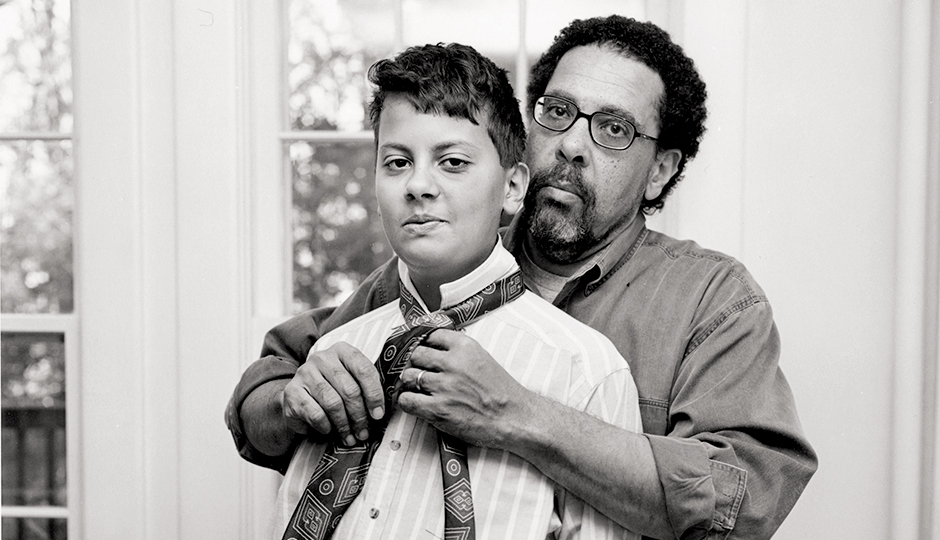On Philly Fatherhood: My Dad and the Father Who Wasn’t

Photograph provided by Malcolm Burnley.
You brace yourself for a phone call; you don’t brace yourself for an email. But one day last year, this message from my father, with no subject line, was waiting in my inbox: “I got an e-mail last night informing me that Paul Burnley had died,” it began. “No details about when or how.” An email about an email about the death of my grandfather: Abstract and abrupt, it might as well have been a telegraph, all 135 words of it. I’d gone through the deaths of all my other grandparents, each one marked by a memory of my dad gently unspooling the facts, either in front of me or over the phone. His crackly voice on the other end of the line, trying to comfort me with a She died peacefully to soften the blow. But now, after the death of his father, he seemed unreachable.
The remove in my father’s words was true to form for how he spoke about Paul. (And it was always Paul, never Dad.) They’d had no contact in 35 years. If there is such a thing as visceral detachment, I could feel it that morning when I called him, 145 miles away, and he explained that the funeral had already happened. “Strange,” my dad repeated several times, when I probed him on how he was feeling. I thought it would be healthy to talk — about something, anything, really, to get out what inevitably was buried inside him. But all I got from him was an “I don’t know how I feel.”
When I was growing up, my father was never anything but forthcoming, not to mention thoughtful, creative (he’s an artist) and caring. He was the type of Little League coach who made sure everyone got an at-bat. But who my father was as a man, as a son in his own right, has never been fully knowable, given how sparingly — never angrily, just factually — he spoke about Paul.
As I put down the phone, I began crying uncontrollably. Grieving over someone I’d never known, a relationship I’d never had.
Paul loomed like a large ghost in my childhood, very much present in his absence. The few details I’d gleaned over the years — he was a sailor in the Navy, a deadbeat dad, someone never to be trusted — didn’t satisfy my curiosity. My mother told me that Paul was around intermittently for my dad’s teenage years, popping up a few times annually to promise picnics and trips to the zoo that he never followed through on. Outside that, Paul’s life was an enigma to my dad. So in college, I took a deep dive, found out where Paul was living (in a modest five-room home in North Carolina), what he did for work (journalism, to my uncomfortable surprise), and that he had a wife and no more children.
Then, the bombshell. In 2008, Paul self-published a novel, pockmarked with typos, that had in it a character resembling my father as a boy, another like my grandmother, and an ex-Navy protagonist, in 1950s/1960s St. Louis — all of which are true-to-life biographical details, except for the obvious: The stand-in for Paul happens to be an involved, loving, heroic father. Aspects of my father’s real life that Paul never witnessed, like Dad’s juvenile hip surgery, became plot points flush with father-son intimacy. It was eerie to read, and I thought about my dad the whole time, trying to size up the novel: cryptic apology or revisionist history? I wondered if Paul was writing about the man he wished he’d been.
My mom, ever protective of my dad, went off when she found out: “He is not worthy of our attention. He’s perverted. I guess he’s always lived in a fantasy world.” My dad calmly listened to what I’d found and declined to read the book. “I’ve made peace with my father,” he said in the same serene manner he had after Paul’s death. “You probably know as much about him as I do.”
There are some things you won’t understand until you have kids, I’ve been told, so I’ll have to take my dad’s word on this, the way I took his word on shooting free throws and figure drawing. For him, I think parenting was coping, a way to relieve some of the void Paul had left. From a young age, I remember him telling my older brother and me that he tried to give us what he would have wanted — namely, time and attention. He wasn’t perfect, but my dad was abundantly present in my life. At basketball games. At family dinners. To pick me up on the day school let out early on 9/11. Unlike him, I never found myself waiting.
The day I cried for Paul Burnley, I wasn’t grieving over a fictional grandfather. I think I was crying in place of my dad, who’d lost the semblance of a father long ago but had no room to outwardly acknowledge it. Parts of him will always remain unknowable, but I’m lucky to have a father who actually wanted to be one. So there were tears of gratefulness, too.
Published as “And Now, A Moment For Our Dads” in the June issue of Philadelphia magazine.


